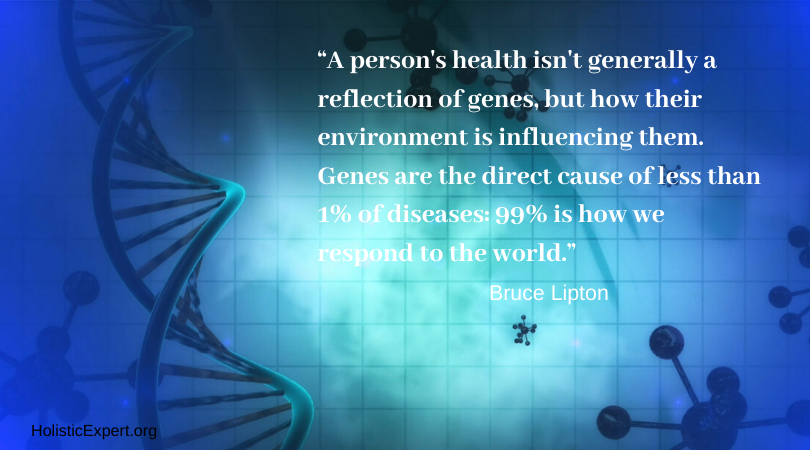Most people think that we are born with a unique set of genes that come from both of our parents and that they determine our destinies. However, your genotype is not your fate. It means that any genetic predisposition to diseases, behaviors, and addictions can be altered. This is possible through gene expression.
Gene expression shows up as phenotype and includes not only straightforward visible characteristics like your height and eye color but also your overall health, your disease history, and even your behavior and general tendencies.
A lot of research has been done in recent years on the epigenome and the effect of environmental factors on a gene’s expression. Epigenes overlay the DNA sequence code of the genes and influence their activities. The simplest way to think about the epigenome is that it’s all about the biochemical switches (signals) that turn genes on and off in particular cells at particular times of life. The biochemical switches of epigenes are mechanisms that change the behavior of genetic material without changing any DNA sequences. Signals come from inside the cell, from neighboring cells, or from the outside world (environment).
Early in development, most signals come from within cells or from neighboring cells. Mom’s nutrition is also important at this stage because it is an information for the cell function. The food she brings into her body forms the building blocks for shaping the growing fetus and its developing epigenome. Other types of signals, such as stress hormones, antibody or toxins can also travel from mom to fetus.
After birth and as life continues, a wider variety of environmental factors start to play a role in shaping the epigenome. Social interactions, physical activity, diet, and other inputs generate signals that travel from cell to cell throughout the body. In early development, signals from within the body continue to be important for many processes, including physical growth and learning. Hormonal signals trigger big changes at puberty and reproductive age.
Even into old age, cells continue to listen for signals. Environmental signals trigger changes in the epigenome, allowing cells to respond dynamically to the outside world. Internal signals direct activities that are necessary for body maintenance, such as replenishing blood cells and skin, and repairing damaged tissues and organs. During these processes, just like during embryonic development, the cell’s experiences are transferred to the epigenome, where they shut down or activate specific sets of genes. For instance, shutting down apoptotic (programmed cell death) genes and activating cell growth genes will result in tumor creation.
Chemical pollutants, dietary components, temperature changes, and other external stressors as well as metabolic byproducts, oxidative stress, and other internal waste can indeed have long-lasting effects on human development and health—sometimes even in subsequent generations—by modifying gene expression. Some examples of epigenetic changes are aging, many types of cancers and degenerative diseases like type 2 diabetes, cardiovascular diseases, Alzheimer’s disease, autoimmune disorders, and many other mental and physical conditions. It means that your lifestyle, dietary choices, behaviors, and habits can positively or negatively affect your own and subsequent generations’ gene expression.

The way we nurture our bodies affects our genes.
Research shows that dietary chemicals (nutrients) can affect gene expression directly or indirectly. At the cellular level, nutrients may:
- Act as receptors,
- Be metabolized by metabolic pathways, or
- Positively or negatively affect cell signaling.
The interaction between the nutritional environment and the cellular/genetic processes is being referred to as “nutrigenomics”. Nutrigenomics is how common dietary chemicals (i.e., food) affect health by altering the expression and/or the structure of an individual’s genetic makeup.
The University of California at Davis published its study on nutritional genomics in 2003 and concluded:
- Common dietary chemicals act on the human genome, either directly or indirectly, to alter gene expression or structure.
- Under certain circumstances and in some individuals, diet can be a serious risk factor for a number of diseases.
- Some diet-regulated genes are likely to play a role in the onset, incidence, progression, and/or severity of chronic diseases.
- The degree to which diet influences the balance between healthy and diseased states may depend on an individual’s genetic makeup.
- Dietary intervention based on knowledge of nutritional requirements, nutritional status, and genotype (i.e., individualized nutrition) can be used to prevent, mitigate, or cure chronic disease.
Based on the knowledge we gain from this research, modifying your diet can help you be in control of your own health and produce healthy offspring, since diet can influence gene expression.
We each have unique genetic makeups that makes us process, digest, and assimilate the foods we eat differently. This can scientifically explain the expression “What is a good food for one person can be a poison for another.” No diet is “one size fits all.” What your skinny girlfriend eats might not agree with your unique metabolic type or the way you process certain foods.
In the beginning of my wellness-consulting career, I noticed that some people didn’t respond to nutritional regimens or detox as well as others. As I explored the subject of nutrition and healthy living more deeply, I discovered and learned the mind-body-spirit concept and a holistic way of practice. Bioindividuality is the main approach I now implement in my work, and it allows me to look at the person’s nutritional, physical, and mental needs from a whole body perspective.
I believe that Nutrigenomics is a very promising discipline that allow us to utilize the concept of personalized nutrition based on an individual’s genetic makeup, and it can change the future of health care. Only 5 years ago, when I was writing about it in my book “Listen to Your Body and Regain Your Health”, epigenetic testing was available only in scientific setting. Now it is accessible for anyone who is interested in optimizing health, prevent diseases and prolong life.
If you would like to take advantage of an introductory price for epigenetic testing, please order it here.
If you would like to know if it is a right test for you, please schedule a free 30 minutes consultation with me here.


